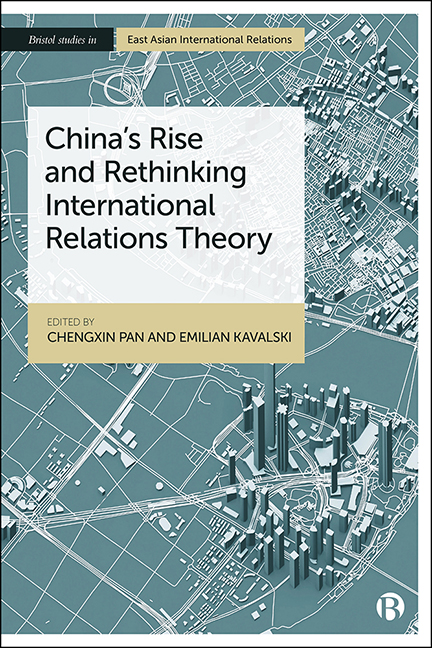Book contents
- Frontmatter
- Contents
- List of Abbreviations
- Notes on Contributors
- Acknowledgements
- Introduction: The Rise of China and Its Challenges to International Relations Theory
- PART I Theorizing China’s Rise: Beyond Eurocentric Knowledge Production
- PART II Theorizing China’s Rise: Critical Reflection on Mainstream Frameworks
- Epilogue: Towards International Relations beyond Binaries
- Index
Epilogue: Towards International Relations beyond Binaries
Published online by Cambridge University Press: 15 September 2022
- Frontmatter
- Contents
- List of Abbreviations
- Notes on Contributors
- Acknowledgements
- Introduction: The Rise of China and Its Challenges to International Relations Theory
- PART I Theorizing China’s Rise: Beyond Eurocentric Knowledge Production
- PART II Theorizing China’s Rise: Critical Reflection on Mainstream Frameworks
- Epilogue: Towards International Relations beyond Binaries
- Index
Summary
Introduction
This project started with the aim of reconsidering the effects of China and its rise on the knowledge production of International Relations (IR). In particular, the contributions to this volume have probed why the phenomena and transformations spurred by China's rise do not seem to have been accorded the requisite attention by IR theory. Both the scholarship on and the history of the discipline indicate that any major junctures in the patterns of world affairs have invariably exhorted urgent reconsideration of IR's frameworks for explanation and understanding. From the origins of IR in the wake of the First World War, all through the vicissitudes of the ‘long twentieth century’ – the Second World War, the decolonization conflicts, the end of the Cold War, and the ‘war on terror’ (to name only some of the cornerstones) – IR theory has tended to respond quickly to such momentous events in the dynamics of world affairs by offering new perspectives, interpretations and formulations. Even if we were to put aside the narrow focus on warfare as the marker of major change, Japan's economic – and potential political and military – rise during the 1970s and 1980s provoked substantive critical reflection and theory building. Starting with the so-called ‘neo-neo’ debate and the analytical framework of ‘complex interdependence’, going through the proliferation of perspectives in International Political Economy, and the introduction of concepts such as ‘developmental state’ and ‘soft power’, all these innovations in IR theory developed against the background of either concern about, or consideration of, the question how the West (and, especially, the United States) would fare under possible Japanese hegemony. The probability of such a shift seemed to increase with the collapse of the Soviet Union and the dissolution of the bipolar Cold War order. Admittedly, much of the effort backstopping such theory building was aimed at reinforcing the primacy of Western actors and allaying the fears that Japan could ever challenge their hegemony. Joseph S. Nye (1992: 99– 100) seems to offer an apt summary of these theoretical commitments in his acknowledgement that
there are significant limits to Japanese power. The three main resources to produce power in international politics include military strength, economic capabilities, and ‘soft power,’ that is, cultural and ideological appeal. Japan's portfolio of power resources is primarily economic. … The United States and Europe have more universalistic cultures and more inclination to proselytize.
- Type
- Chapter
- Information
- China’s Rise and Rethinking International Relations Theory , pp. 234 - 244Publisher: Bristol University PressPrint publication year: 2022



